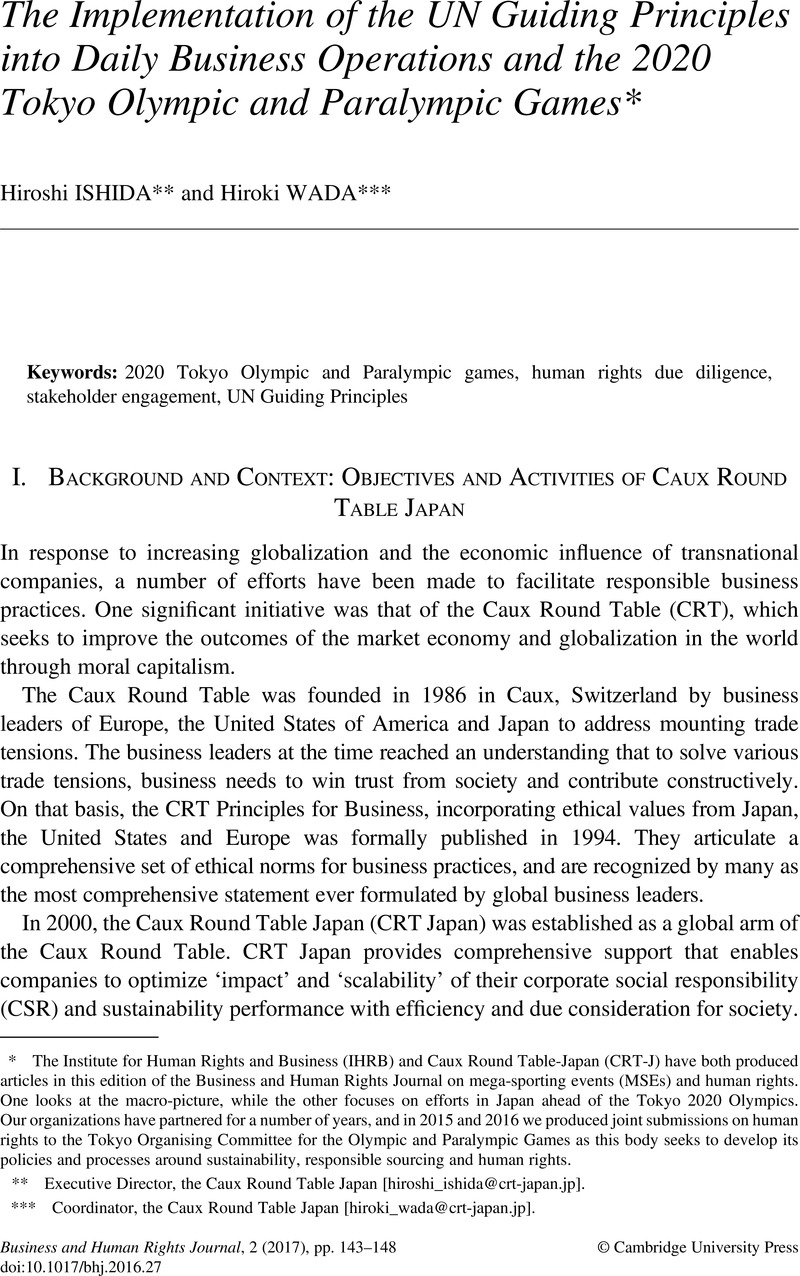Article contents
The Implementation of the UN Guiding Principles into Daily Business Operations and the 2020 Tokyo Olympic and Paralympic Games*
Published online by Cambridge University Press: 23 January 2017
Abstract

Keywords
- Type
- Developments in the Field
- Information
- Copyright
- Copyright © Cambridge University Press
Footnotes
The Institute for Human Rights and Business (IHRB) and Caux Round Table-Japan (CRT-J) have both produced articles in this edition of the Business and Human Rights Journal on mega-sporting events (MSEs) and human rights. One looks at the macro-picture, while the other focuses on efforts in Japan ahead of the Tokyo 2020 Olympics. Our organizations have partnered for a number of years, and in 2015 and 2016 we produced joint submissions on human rights to the Tokyo Organising Committee for the Olympic and Paralympic Games as this body seeks to develop its policies and processes around sustainability, responsible sourcing and human rights.
Executive Director, the Caux Round Table Japan [hiroshi_ishida@crt-japan.jp].
Coordinator, the Caux Round Table Japan [hiroki_wada@crt-japan.jp].
References
1 Nissan Motor Co., Ltd., ‘2007 Sustainability Report’ (2008), http://www.nissan-global.com/EN/DOCUMENT/PDF/SR/2007/SR2007_E_all.pdf (accessed 19 January 2016).
2 Caux Round Table Japan, ‘Sustainable Navigation’, http://crt-japan.jp/en/project-overview/sustainable_navigation/ (accessed 20 January 2016).
3 Nippon CSR Consortium, ‘Human Rights Issues by Sector v.4’ (7 December 2015), http://crt-japan.jp/files 2015/2015SHE/Human rights issues by sector v4 EN.pdf (accessed 30 August 2016).
4 Kaisha, Nippon Yusen Kabushiki, ‘NYK Report 2007’ (2008)Google Scholar, https://www.nyk.com/english/ir/library/nyk/pdf/2014_nykreport_all.pdf (accessed 19 January 2016).
5 Human Rights Council, ‘Guiding Principles on Business and Human Rights: Implementing the United Nations “Protect, Respect, and Remedy” Framework’, A/HRC/17/31 (21 March 2011).
6 Human Rights Council, ‘Final report of the Human Rights Council Advisory Committee on the possibilities of using sport and the Olympic ideal to promote human rights for all and to strengthen universal respect for them’, A/HRC/30/50 (17 August 2015).
7 Human Rights Watch, ‘Race to the Bottom: Exploitation of Migrant Workers Ahead of Russia’s 2014 Winter Olympic Games in Sochi’, (2013), https://www.hrw.org/report/2013/02/06/race-bottom/exploitation-migrant-workers-ahead-russias-2014-winter-olympic-games (accessed 19 January 2016).
8 International Textile Garment & Leather Workers’ Federation, ‘An Overview of Working Conditions in Sportswear Factories in Indonesia, Sri Lanka & the Philippines’, (2011), http://www.ituc-csi.org/IMG/pdf/ITGLWFSportswearReport2011.pdf (accessed 19 January 2016).
9 The Group of Experts consists of members from NGOs/NPOs, universities, confederations, legal offices, sports councils and centers for human rights in Japan: http://crt-japan.jp/files2014/2-4-0-olympic2020/pdf/20150330_olympic_theme_questions_en.pdf (accessed 15 November 2016).
10 The Group of Experts for Sustainable Tokyo Olympic and Paralympic Games, ‘Sustainability Themes for the Tokyo Olympic and Paralympic Games in 2020 (draft)’, (2015), http://crt-japan.jp/files2014/2-4-0-olympic2020/pdf/20150330_olympic_theme_questions_en.pdf (accessed 19 January 2016).
11 The Group of Experts for Sustainable Tokyo Olympic and Paralympic Games, ‘Result of summary on “Sustainability Themes for the Tokyo Olympic and Paralympic Games in 2020 (draft)”’, (2015), http://crt-japan.jp/files2014/2-4-0-olympic2020/pdf/The%20report%20of%20Sustainability%20Themes%20for%20the%20Tokyo%20Olympic%20and%20Paralympic%20Games%20in%202020_EN.pdf (accessed 19 January 2016).
12 Caux Round Table Japan and the Institute for Human Rights and Business, ‘Proposed Human Rights Statement for the Tokyo Olympic and Paralympic Games in 2020’ (16 November 2015), http://crt-japan.jp/files2014/2-4-0-olympic2020/pdf/A%20Proposed%20Human%20Rights%20Statement%20for%20the%20Tokyo%202020%20Olympics%20EN.PDF (accessed 30 August 2016).
13 Caux Round Table Japan and the Institute for Human Rights and Business, ‘Proposed Sustainable Sourcing Policy for the Tokyo Olympic and Paralympic Games in 2020’ (12 February 2015), http://crt-japan.jp/files2014/2-4-0-olympic2020/pdf/Proposed%20Sustainable%20Sourcing%20Code%20for%20the%20Tokyo%20Olympic%20and%20Paralympic%20Games%20in%202020%20EN.pdf (accessed 30 August 2016).
14 The Tokyo Organising Committee of the Olympic and Paralympic Games, ‘Sustainability’, https://tokyo2020.jp/en/games/sustainability/ (accessed 29 July 2016).
15 The Tokyo Organising Committee of the Olympic and Paralympic Games, ‘The Tokyo 2020 Olympic and Paralympic Games High-level Sustainability Plan’ (January 2016), https://tokyo2020.jp/en/games/sustainability/data/sus-plan-EN.pdf (accessed 30 August 2016).
16 Ibid.
17 The Tokyo Organising Committee of the Olympic and Paralympic Games, The Tokyo 2020 Fundamental Principles for the Sustainable Sourcing Code (January 2016), https://tokyo2020.jp/en/games/sustainability/data/sus-principles-EN.pdf (accessed 30 August 2016).
18 Caux Round Table Japan and the Institute for Human Rights and Business, ‘Submission to the Tokyo Organising Committee of the Olympic and Paralympic Games’ (12 February 2016), http://crt-japan.jp/files2014/2-4-0-olympic2020/pdf/Feedback on the High-level Sustainability Plan and Sustainable Sourcing Code EN.pdf (accessed 30 August 2016).
- 4
- Cited by


